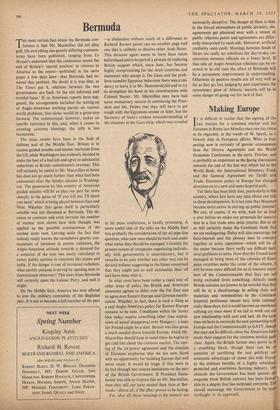Making Europe
T is difficult to realise that the signing of the Itwo treaties for a common market and for Euratom in Rome last Monday may one day come to be regarded, in the words of M. Spaak, as a historic date in European affairs. What is hap- pening now is certainly of greater consequence than the Ottawa Agreement and the World Economic Conference in the early Thirties, and is probably as important as the !acetic discussions towards the end of the last war which led to the World Bank, the International Monetary Fund, and the General Agreement on Tariffs and Trade. Economic policy in Europe has changed direction on to a new and more hopeful path.
Yet there has been little fuss, particularly in this country, where few have any idea about our role in these developments. Is it not time that Ministers became more active in stirring up public interest? , We can, of course, if we wish, wait for at least a year before we make our proposals for associa- tion in a free trade area quite precise. But to do so will certainly make the Continent think that we are malingering. Delay will also encourage the faint-hearted and the phoney here to conspire together in noisy opposition—which will be all the easier because there really are difficult tech- nical problems to solve. Now that the French have managed to bring most of the colonies of Euro- pean countries under the cover of the scheme, it will be even more difficult for us to reassure mem- bers of the Commonwealth that they are not being excluded from something. Already some British colonies are known to be worried that they will be at a disadvantage in selling their ray/ materials and commodities to the Continent. Imperial preference means very little comma• cially these days, but it could become an emotional rallying cry once more if we fail to work out our new relationship with care and tact. At the saint time we have to reconcile the new partnership with Europe and the Commonwealth to GATT, though this may not be difficult, since the Americans have made their support for the common market quite clear. Again, the British farmer may prove to be a stumbling block, though there can be nd question of sacrificing the real political and economic advantages of closer ties with Europe to the dubious benefits of a highly subsidised, protected and overblown farming industry. Oae obstacle the Government has been spared—the response from British industry has been favour' able to a degree that has surprised everyone. This should encourage the Government to be more forthright in its approach.


































 Previous page
Previous page